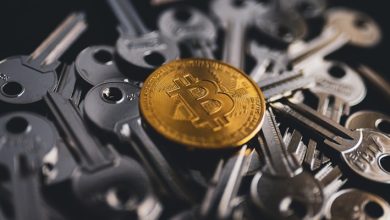Exploring Governance Tokens: Power to the Community

- Understanding Governance Tokens and their Role in Decentralized Governance
- The Rise of Governance Tokens and Their Impact on Community Decision-Making
- Exploring the Mechanisms Behind Governance Tokens and How They Empower Users
- Case Studies: Successful Implementation of Governance Tokens in Various Projects
- Challenges and Opportunities of Utilizing Governance Tokens for Community Governance
- The Future of Governance Tokens: Trends and Innovations in Decentralized Governance
Understanding Governance Tokens and their Role in Decentralized Governance
Governance tokens play a crucial role in decentralized governance by granting holders the power to participate in decision-making processes within a decentralized autonomous organization (DAO). These tokens are issued on blockchain networks and represent voting rights on proposals related to the future of the project. In essence, governance tokens empower token holders to have a say in the direction of the project, ensuring that decisions are made in a democratic and transparent manner.
By holding governance tokens, individuals can actively engage in the governance of a decentralized protocol or platform. This participation can involve voting on key decisions such as protocol upgrades, funding allocations, and changes to the project’s parameters. The more tokens a holder possesses, the greater their voting power and influence within the community. This system of decentralized governance ensures that decisions are made collectively by the community rather than by a centralized authority.
Furthermore, governance tokens can also be used to incentivize active participation and engagement within the community. Projects often reward token holders for participating in governance processes, such as voting on proposals or staking their tokens for a certain period of time. This not only encourages community involvement but also helps to secure the network and maintain its integrity.
Overall, governance tokens are an essential component of decentralized governance, providing a mechanism for token holders to collectively govern the future of a project. By giving individuals a voice and a stake in the decision-making process, governance tokens help to foster a sense of ownership and belonging within the community. As the decentralized finance (DeFi) space continues to grow, governance tokens will play an increasingly important role in shaping the future of decentralized protocols and platforms.
The Rise of Governance Tokens and Their Impact on Community Decision-Making
Governance tokens have been on the rise in the decentralized finance (DeFi) space, offering a new way for communities to participate in decision-making processes. These tokens grant holders the ability to vote on proposals that impact the future direction of a project or platform. This shift towards decentralized governance has empowered community members to have a say in the development and evolution of the projects they are invested in.
The impact of governance tokens on community decision-making cannot be understated. By giving token holders a voice in key decisions, projects are able to align their interests with those of their most dedicated supporters. This level of engagement fosters a sense of ownership and responsibility within the community, leading to more informed and collaborative decision-making processes.
Furthermore, governance tokens incentivize active participation within the community. Holders are motivated to stay informed about project developments and vote on proposals that align with their vision for the future. This increased level of engagement not only strengthens the community but also leads to more transparent and accountable decision-making processes.
Overall, the rise of governance tokens represents a significant shift towards community-driven governance models in the DeFi space. By empowering token holders to participate in decision-making processes, projects can tap into the collective wisdom and expertise of their community members. This democratization of governance has the potential to revolutionize how projects are managed and evolve in the future, ultimately leading to more resilient and sustainable ecosystems.
Exploring the Mechanisms Behind Governance Tokens and How They Empower Users
Governance tokens play a crucial role in decentralized finance (DeFi) ecosystems, providing users with a voice in decision-making processes. These tokens serve as a form of digital asset that allows holders to vote on proposed changes or updates to the network. By holding governance tokens, users gain the power to influence the direction of the platform and shape its future development.
One of the key mechanisms behind governance tokens is the concept of voting rights. Holders of these tokens can participate in governance proposals by casting their votes on various issues such as protocol upgrades, fee adjustments, or asset listings. This democratic process empowers users to have a say in how the platform is governed, ensuring that decisions are made in a transparent and inclusive manner.
Another important aspect of governance tokens is their ability to incentivize active participation within the community. By rewarding users with governance tokens for their engagement, platforms can encourage users to contribute valuable insights and feedback. This not only strengthens the community but also ensures that decision-making is driven by those who are most invested in the platform’s success.
Overall, governance tokens are a powerful tool for empowering users and fostering community-driven governance within DeFi ecosystems. By giving users a voice and a stake in the platform’s future, these tokens help create a more decentralized and democratic financial system where decisions are made collectively for the benefit of all stakeholders.
Case Studies: Successful Implementation of Governance Tokens in Various Projects
Case studies have shown successful implementation of governance tokens in various projects, demonstrating the power they bring to the community. These tokens have enabled decentralized decision-making processes, allowing token holders to vote on proposals and influence the direction of the project. Let’s explore some examples of how governance tokens have been effectively utilized:
- In Project A, the introduction of governance tokens led to increased community engagement and participation. Token holders were able to vote on key decisions such as protocol upgrades and fund allocations, resulting in a more transparent and inclusive governance structure.
- Project B integrated governance tokens to incentivize active participation from its community members. By rewarding token holders for voting and contributing to the project, they were able to create a more vibrant and involved community ecosystem.
- Another project, Project C, used governance tokens to distribute voting power based on token holdings. This helped prevent centralization of control and ensured that decisions were made in the best interest of the entire community.
Overall, these case studies highlight the importance of governance tokens in empowering the community and fostering a more democratic governance model. By giving stakeholders a voice in the decision-making process, projects can benefit from increased trust, transparency, and alignment of incentives. As the use of governance tokens continues to grow, we can expect to see even more innovative applications and successful implementations in the future.
Challenges and Opportunities of Utilizing Governance Tokens for Community Governance
One of the key challenges of utilizing governance tokens for community governance is the potential for centralization. While governance tokens are meant to empower community members, there is a risk that a small group of token holders could consolidate power and make decisions that do not reflect the broader community’s interests. This could lead to disenchantment among community members who feel marginalized and excluded from the decision-making process.
On the other hand, governance tokens also present exciting opportunities for community governance. By allowing token holders to vote on proposals and steer the direction of a project or platform, governance tokens can foster a sense of ownership and accountability among community members. This can lead to more transparent and democratic decision-making processes that prioritize the collective good over individual interests.
To mitigate the risks associated with governance tokens, it is essential to design robust governance structures that promote inclusivity and diversity. This may involve implementing mechanisms such as quadratic voting or delegation to ensure that decision-making power is distributed equitably among token holders. Additionally, ongoing community engagement and education are crucial to empower all members to participate meaningfully in governance processes and hold token holders accountable.
In conclusion, while there are challenges to overcome, the opportunities presented by governance tokens for community governance are significant. By striking a balance between decentralization and inclusivity, governance tokens have the potential to revolutionize how communities govern themselves and collaborate towards common goals. It is essential for projects and platforms to thoughtfully design their governance mechanisms to maximize the benefits of governance tokens and create a more equitable and resilient community ecosystem.
The Future of Governance Tokens: Trends and Innovations in Decentralized Governance
Governance tokens are a key component of decentralized governance, allowing token holders to participate in decision-making processes for blockchain projects. As the crypto space continues to evolve, trends and innovations in decentralized governance are shaping the future of governance tokens.
One trend that is gaining momentum is the rise of decentralized autonomous organizations (DAOs), which are essentially community-run entities that use governance tokens to facilitate decision-making. DAOs enable token holders to vote on proposals and steer the direction of a project without the need for centralized authority.
Another innovation in decentralized governance is the use of quadratic voting, a mechanism that gives more weight to the votes of token holders who are more invested in a project. This helps prevent manipulation and ensures that decisions are made in the best interest of the community as a whole.
Additionally, some projects are exploring the concept of liquid democracy, which combines elements of direct and representative democracy. In a liquid democracy system, token holders can either vote directly on proposals or delegate their voting power to a representative of their choice.
Overall, the future of governance tokens looks bright, with an array of trends and innovations that promise to empower communities and promote transparency and accountability in blockchain projects. By embracing these advancements, projects can create more inclusive and effective governance systems that truly give power to the people.



